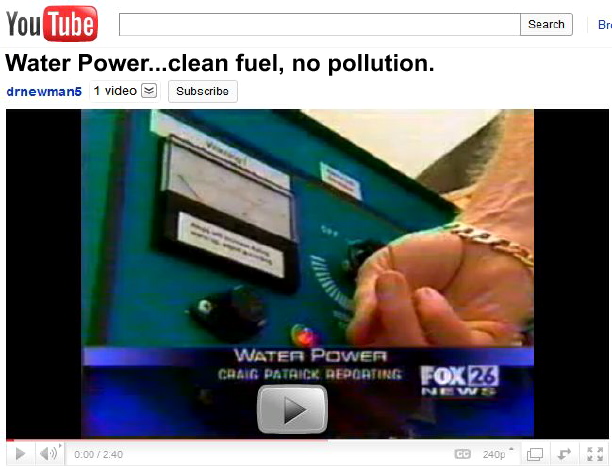
News
Behind the Headlines
Two-Cents Worth
Video of the Week
News Blurbs
Articles
Testimony
Bible Questions
Internet Articles
(2011)
Internet Articles (2010)
Internet Articles
(2009)
Internet Articles (2008)
Internet Articles (2007)
Internet Articles (2006)
Internet Articles (2005)
Internet Articles (2004)
Internet Articles (2003)
Internet Articles (2002)
Internet Articles (2001)


![]()
What happens when you invent
the safest, cleanest, nonpolluting
fuel in the world? Three groups are likely to fight you. But only one
of them will surprise you. First, the oil industry will fight you because
the fuel you invented is one of the cheapest elements on Earth...
except in the Mideast where it is worth its weight in gold. Second, the
auto industry will fight it because they don't own the patent for the
electrolysis process that creates the new fuel. But most of all, the
biggest fight they will have to wage will be against the environmenta-
lists who are fighting the oil giants and the industrialists for clean
air.
You see, while they are fighting for clean air, they really don't want
it
for two reasons. First, if they won and got a pollution-free environ-
ment, they would put themselves out of a job. But second, and more
important, fighting pollution and the ecowackos' make believe man-
made climate change is not about creating a healthier environment,
it's about controlling people.
In the blog under drnewman5's post of the video above, a video viewer, Dean129012 wrote: "...this video was taken 5 years ago, and we are still using gas. There must be a flaw to this." The flaw to this, as noted, is that the three entities mentioned above don't want this to happen. And, in every instance where one small entrepreneur takes on the behemoth industrial complex, expect the entrepreneur to lose. In the end, big business simply waits them out, or buys them out.
Dennis J. Klein of Clearwater, Florida is the inventor of the electrolysis process that creates what his company, Hydrogen Technologies Applications, branded as Aquygen® gas (a new spelling for oxygen). He also created what is now referred to as the "Aquacar." It is, in reality, a hybrid hydrogen-oxygen system (HHOS) that adds 20% to 30% more miles per gallon. An earlier prototype ran totally on the HHOS system, running about 25 miles per ounce. In the video (above), Klein drove his modified Ford Escort 100 miles on four ounces of water.
When Klein formed HTA in 1997, a friend, Pete Dominici pitched in to help him take his Hydrogen Technology patents from a two-room office in Clearwater to consumer markets around the world. At that time, after Klein modified his Ford Escort, the pair were negotiating with one US automaker and the US government. In 2006, Klein demonstrated his technology to members of the US Congress leading to HTA modifying a Hummer for the US military. Thus far, HTA's HHOS engines have passed all government performance safety inspections.
In fact, when you compare HTA's HHOS with the very expensive hydrogen fuel cell technology developed by Chrysler and Honda, which stores hydrogen at a dangerous 10,000 psi, you are generally shocked to learn that Klein's HHOS produces Aquygen® gas on demand at less than 60 psi. The exhaust from a HHOS engine contains minimal emissions—and no CO2.
The best thing about HTA's HHOS system—and the one thing the auto industry does not like about HTA—is that HHOS can be retrofitted for every make and model car on the road today. The fuel cell currently being developed by the auto industry that will quadruple the price of a car, will be an entirely new type of "engine" in the 21st century mode of transportation. HHOS, on the other hand, enhances what is already a proven technology—the internal combustion engine—which has logged trillions of miles over more than 100 years. What's more, HHOS will produce an entirely new industry, creating thousands of new jobs retrofitting millions of gas-powered cars into either hybrids or solely Aquygas® gas powered.
While HTA's HHOS appears to be far more economical, and makes far more sense that the far more expensive hydrogen fuel cells being created by the global automotive industry, why is it not the leader in the hydrogen-oxygen fuel industry? [1] It's too inexpensive. [2] It allows for the retrofitting of any current internal combustion engine vehicle, meaning less sales of new, far more expensive hydrogen fuel cell vehicles, [3] the environmentalists who make their money crying that carbon fuels are creating global warming will be out of a job—and out of an issue, and [4] the globalists who are attempting to redistribute the wealth of the industrial nations through cap & trade carbon credits will like it least of all since they will have to find another scheme to steal what little bit of money we have left by making us pay for the corporations who are, in their view, squandering our clean air and creating global warming even though global temperatures on Earth are solely determined by flare activity during cyclic solar cycles on our Sun.
It seems the only people in the country that would like to retrofit their already paid off, ten year old car with a HHOS will be John Q. Public, who can throw a few plastic gallon jugs of distilled water in the back truck of the car and enjoy a carbon fuel-less vacation while their neighbors are idling in a mile long gas line waiting to buy $7 or $8 per gallon gasoline.

Copyright © 2009 Jon Christian Ryter.
All rights reserved.
